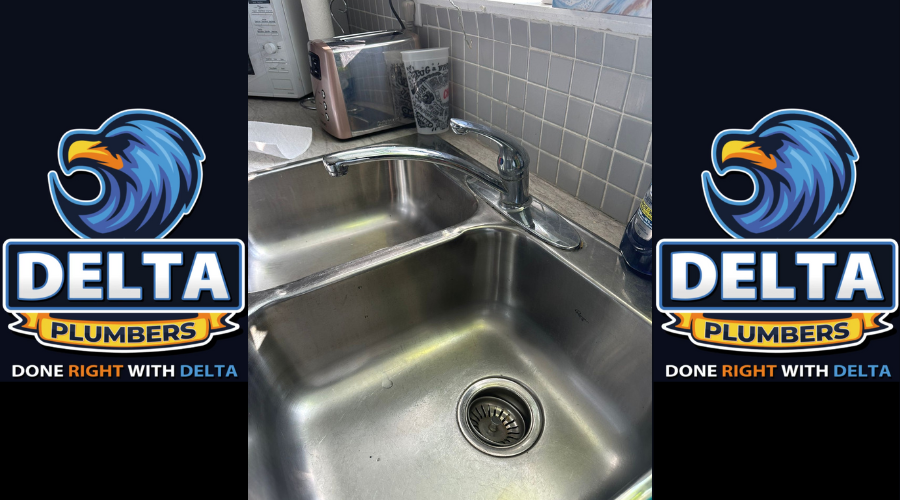Your kitchen sink is one of the hardest-working fixtures in your home, handling everything from washing dishes to food preparation. However, frequent use makes it prone to clogs, especially when we’re not careful about what goes down the drain. Whether it’s food scraps, grease, or soap buildup, preventing clogs in your kitchen sink is crucial to avoid costly repairs and keep your plumbing system functioning smoothly. In this guide, Delta Plumbers will walk you through the best practices to prevent kitchen sink clogs, methods to handle existing blockages, and professional recommendations to keep your sink running efficiently.

Picture Source – Delta Plumbers
How to Avoid Kitchen Sink Clogging?
Preventing clogs in your kitchen sink requires a proactive approach. Here are some key steps to ensure your drain stays clear:
1. Use a Drain Strainer
The first and most effective step in avoiding clogs is using a drain strainer. This small, mesh tool catches food scraps, hair, and other debris before they go down the drain. Simply empty it into the trash after each use to keep your pipes clear.
2. Dispose of Grease Properly
One of the biggest culprits of clogged kitchen drains is grease. Never pour fats, oils, or grease down your sink. Instead, let the grease cool, pour it into a container, and throw it away. Grease solidifies as it cools and can cling to the inside of your pipes, creating blockages over time.
3. Scrape Plates Before Washing
Before rinsing your dishes, make sure to scrape leftover food into the trash or compost bin. Even small food particles can accumulate and cause a blockage. The fewer solids that enter your drain, the better your chances of avoiding a clog.
4. Run Hot Water After Each Use
After using your sink, especially when rinsing dishes with soap or washing food residues, run hot water for a few seconds. Hot water helps dissolve minor grease buildups and flushes out any small particles that might stick to the pipes.
5. Use Dish Soap Regularly
Soap plays an essential role in breaking down grease and oils. Regular use of dish soap in your sink helps reduce the buildup of fats that could eventually cause a clog.
Also Read: Professional Drain Cleaning Service: Benefits and More

Picture Source – Delta Plumbers
Why Does My Kitchen Sink Keep Getting Clogged?
If your kitchen sinks frequently clogs, it’s important to identify the root cause. Understanding why it happens will allow you to take corrective actions and prevent future blockages.
1. Grease Accumulation
As mentioned earlier, grease is a common cause of kitchen clogs. Even if you’re careful, small amounts of grease can still make their way into the drain. Over time, this grease solidifies and narrows the pipe, eventually leading to a clog.
2. Food Particles
Many households make the mistake of allowing food particles to go down the drain. Starchy foods like pasta and potatoes can swell in water, while fibrous vegetables such as celery can wrap around other debris, contributing to blockages.
3. Soap Scum
Soap may seem harmless, but over time, it can build up inside your pipes, particularly if you’re using hard water. This combined with grease can lead to serious blockages that require professional attention.
4. Improper Drain Installation
If your sink was installed incorrectly, it might be prone to clogs. For example, a pipe that is too narrow or not installed with the correct slope can lead to slower drainage, making it easier for debris to accumulate.
5. Mineral Buildup
Hard water contains minerals that can deposit inside your pipes over time. These mineral deposits reduce water flow and, when combined with grease and soap scum, can cause recurring clogs.
Also Read: Repair a Leaking Water Heater: How to Do it?

Picture Source – Delta Plumbers
How to Prevent Buildup in Sink Drain?
Prevention is always better than cure. Here’s how you can reduce buildup and keep your kitchen drain free from clogs:
1. Flush with Boiling Water
One simple method to prevent buildup is to flush your sink with boiling water once a week. Boiling water dissolves grease and soap scum and moves them further down the pipes, helping to prevent buildup.
2. Use Baking Soda and Salt
For a natural preventive measure, pour a mixture of baking soda and salt down your drain once a week. Follow it with hot water. This combination helps break down minor debris and prevents buildup from turning into a clog.
3. Install a Garbage Disposal
If you frequently prepare meals and deal with food scraps, consider installing a garbage disposal. This device grinds food waste into small enough particles to pass through your pipes without causing clogs. However, even with a disposal, avoid dumping excessive amounts of food down the drain at once.
4. Avoid Harsh Chemical Cleaners
Many commercial drain cleaners contain harsh chemicals that can damage your pipes over time. These chemicals may offer a quick fix for buildup, but they can also erode pipes and lead to more serious issues in the long run.
5. Routine Professional Maintenance
A professional plumber can inspect your pipes and remove buildup that you may not even be aware of. Regular maintenance ensures your plumbing system is in good condition and helps prevent clogs before they become problematic.
Also Read: Benefits of Installing a Water Softener

Picture Source – Delta Plumbers
How to Permanently Unclog a Drain?
When you encounter a stubborn clog that won’t go away with basic methods, it’s important to know how to deal with it. Here’s how you can permanently unclog your drain:
1. Plunge the Drain
A plunger is often the first tool to reach for when you have a clog. Make sure the sink contains some water to create a seal around the plunger. Plunge vigorously for about 30 seconds, then check if the water drains properly.
2. Use a Drain Snake
For more serious clogs, a drain snake (also known as a plumbing auger) can be highly effective. This flexible tool is designed to break up and remove debris lodged deeper in the pipes. Simply insert the snake into the drain and twist it until you encounter the clog, then pull the debris out.
3. Try Hydro-Jetting
Hydro-jetting is a professional method that uses high-pressure water to clean your pipes. This technique not only removes clogs but also clears away grease, soap scum, and mineral buildup, leaving your pipes as good as new.
4. Replace Old Pipes
In some cases, clogs are caused by old or damaged pipes that need to be replaced. Corroded or collapsed pipes can trap debris, making it difficult to keep your drains clear. A professional plumber can inspect your pipes and recommend replacement if necessary.
5. Call Delta Plumbers
If you’ve tried everything and the clog persists, it’s time to call in the professionals. At Delta Plumbers, we have the tools and expertise to unclog any drain, no matter how severe. Our plumbers use the latest technology to diagnose the problem and offer a permanent solution.
Also Read: How to Install New Kitchen Faucet: Delta Plumbers

Picture Source – Delta Plumbers
Why Should You Never Use Baking Soda and Vinegar to Unclog a Drain?
While baking soda and vinegar are commonly recommended for unclogging drains, these natural remedies can sometimes do more harm than good.
1. Limited Effectiveness
Baking soda and vinegar react to produce carbon dioxide gas, which can help to break up minor clogs. However, the reaction is often too weak to tackle more serious blockages caused by grease, food, or hair.
2. Temporary Solution
Even when baking soda and vinegar do work, the effects are often temporary. The combination may clear the surface of the clog, but it rarely removes the deeper buildup that can cause recurring problems.
3. Potential Damage to Pipes
Although baking soda and vinegar are natural substances, their repeated use can lead to the degradation of certain types of pipes. The foaming reaction may also push clogs deeper into your system, making it harder for professional plumbers to remove them later.
4. Better Alternatives Available
Professional-grade solutions, such as enzymatic cleaners or mechanical methods like snaking, are more effective and safer for your pipes. These methods remove the entire clog, preventing future blockages.
Also Read: Advantages of Using PEX Piping in Plumbing

Picture Source – Delta Plumbers
What Do Professional Plumbers Use to Unclog Drains?
Professional plumbers have a variety of tools at their disposal to deal with stubborn clogs. Here’s what they typically use:
1. Plumbing Auger
A plumbing auger, also known as a drain snake, is a flexible, coiled tool used to break up clogs and pull debris out of your pipes. This tool is effective for most types of blockages and is a go-to for professional plumbers.
2. Hydro-Jetting Equipment
Hydro-jetting is a high-powered method that uses pressurized water to blast away clogs and buildup inside your pipes. This technique is extremely effective for cleaning grease, soap, and mineral deposits from your drains.
3. Enzymatic Cleaners
Unlike chemical drain cleaners, enzymatic cleaners are safe for your pipes and the environment. These cleaners use bacteria and enzymes to break down organic matter, such as food and hair, without harming your plumbing system.
4. CCTV Drain Cameras
Sometimes, identifying the cause of a clog requires a closer look. Plumbers often use CCTV cameras to inspect the inside of your pipes and locate the blockage. This technology helps determine the best method to clear the clog.
5. Pipe Replacement
If the blockage is due to damaged or corroded pipes, the only solution may be to replace the affected section. Plumbers have the expertise to assess whether a repair or replacement is necessary.
Also Read: Benefits of Regular Drain Cleaning

Picture Source – Delta Plumbers
Where is the Most Common Place for a Sink to Clog?
Understanding where clogs are most likely to occur can help you take preventive measures and deal with potential issues before they worsen. Here are the most common places where kitchen sink clogs happen:
1. The P-Trap
The P-trap is the curved section of pipe located beneath your sink. Its purpose is to trap debris and prevent it from entering the plumbing system, but this also makes it one of the most common places for clogs to occur. Grease, food particles, and soap scum often accumulate here, resulting in slow drainage or complete blockages. Regularly cleaning the P-trap can help avoid clogs in this area.
2. The Garbage Disposal
For sinks with a garbage disposal, blockages can occur when inappropriate items are put into it. Grease, fibrous vegetables (like celery), and large food particles can jam the disposal or clog the pipes beyond it. Always run cold water when using the garbage disposal and avoid overloading it to minimize the risk of clogs.
3. The Drain Tailpipe
The tailpipe is the section of pipe directly connected to the sink drain and P-trap. Over time, this area can become a magnet for grease, food particles, and soap scum, leading to buildup that narrows the pipe’s diameter. If you notice slow drainage, the tailpipe may be where the clog is located.
4. The Branch Drain Line
The branch drain line connects the sink to the main drainage system. Clogs can occur in this pipe due to a buildup of debris from multiple fixtures, including your dishwasher or other sinks in the home. These clogs are often more challenging to reach and may require professional assistance to remove.
5. The Main Sewer Line
In some cases, a kitchen sink clog is symptomatic of a larger issue with your main sewer line. Tree roots, debris, or collapsed pipes can block the main sewer line, causing slow drainage or backups in multiple areas of your home. If you’re experiencing clogs in several fixtures, the main sewer line may be the culprit, and professional intervention will be necessary.
Final Thoughts: Maintain a Healthy Kitchen Drain with Delta Plumbers
Your kitchen sink plays a critical role in your daily life, and keeping it free from clogs ensures it operates efficiently. By following the prevention tips outlined in this guide and addressing clogs promptly, you can avoid costly repairs and enjoy hassle-free drainage. Remember, while DIY methods can be effective for minor clogs, persistent or severe blockages should always be handled by professionals.
Delta Plumbers are your trusted experts in handling all types of kitchen sink clogs and plumbing issues. From regular maintenance to emergency services, our team is equipped with the tools and experience to keep your plumbing system in top condition. Contact Delta Plumbers today for more information on preventing clogs or to schedule a professional drain cleaning service.
Keep your kitchen sink running smoothly by partnering with Delta Plumbers. You deserve reliable plumbing, and we’re here to ensure it!









